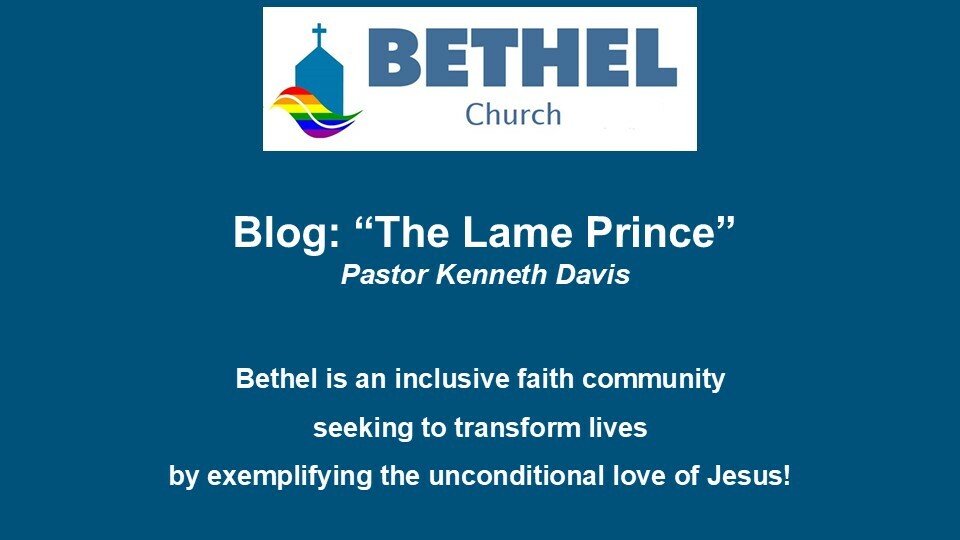The Lame Prince


In a world that seems overflowing with meanness and negativity, there's a powerful antidote that we sometimes overlook: kindness. This simple yet profound act has the potential to transform lives, heal wounds, and create ripples of positivity that extend far beyond our immediate circle.
The story of David and Mephibosheth in 2 Samuel 9 provides a compelling illustration of extraordinary kindness that challenges us to reconsider our own actions and attitudes. As we explore this narrative, we're invited to reflect on the nature of true kindness and how we might embody it in our daily lives.
The story begins with a surprising question from King David: "Is there still anyone left of the house of Saul, that I may show him kindness for Jonathan's sake?" (2 Samuel 9:1). This query is remarkable for several reasons. Firstly, it goes against the typical behavior of kings in that era, who would usually eliminate potential rivals to secure their throne. Secondly, it demonstrates David's commitment to a promise he made to his dear friend Jonathan, Saul's son, years earlier.
David's actions remind us of the importance of keeping our promises, even when circumstances change. How often do we make casual promises, only to conveniently forget them when fulfilling them becomes inconvenient? David's father taught him a valuable lesson: never make a promise unless you intend to keep it. This principle guided David's actions, leading him to seek out someone to bless, rather than waiting for an opportunity to present itself.
The story unfolds as David's servants locate Mephibosheth, Jonathan's son, who had been crippled in both feet since childhood. Mephibosheth's response to David's summons is telling: he approaches with fear and humility, referring to himself as a "dead dog." He clearly expected judgment or punishment from the new king, not kindness.
David's response is a beautiful picture of grace: "Do not fear, for I will show you kindness for the sake of your father Jonathan, and I will restore to you all the land of Saul your father, and you shall eat at my table always" (2 Samuel 9:7). This act of kindness goes beyond mere restoration of property; it's an invitation into intimate fellowship, symbolized by the sharing of meals at the king's table.
This story challenges us to consider: How often do we go out of our way to show kindness, especially to those who might consider themselves our enemies or who have nothing to offer in return? David's actions reflect the very heart of God, who invites all people to the table – the worthy and unworthy, the haves and have-nots, the up-and-coming and the down-and-outs.
The concept of "random acts of kindness" has gained popularity in recent years, and for good reason. Studies have shown that practicing kindness not only benefits the recipient but also reduces stress and increases happiness in the giver. Kindness is not just a nice idea; it's an essential component of healthy communities and personal well-being.
Imagine the impact if each of us committed to performing one random act of kindness each week. What if we deliberately sought out opportunities to bless others, especially those we might typically overlook or avoid? The shy student, the grumpy neighbor, the often-ignored coworker – all present opportunities for us to extend kindness and potentially change someone's day or even their life.
But true kindness often requires more than just a single act. It may involve ongoing commitment and sacrifice, as demonstrated by David's provision for Mephibosheth. David not only restored Saul's lands to Mephibosheth but also arranged for Ziba, Saul's former servant, to manage the property and provide for Mephibosheth's needs. This ensured that David's act of kindness had lasting impact and practical benefit.
As we consider how to cultivate kindness in our own lives, we might ask ourselves some challenging questions:
1. Am I truly a kind person? What would my family, friends, or coworkers say about my kindness?
2. When was the last time I did something for someone without being asked?
3. Do I show kindness consistently, or only when it's convenient or visible to others?
4. How can I be more intentional about seeking opportunities for kindness?
The practice of kindness isn't always easy. It may require us to overcome our fears, set aside our prejudices, or sacrifice our time and resources. But the potential impact is immeasurable. Like a pebble dropped in a pond, a single act of kindness can create ripples that extend far beyond our immediate circle of influence.
In a world that often seems dominated by division, conflict, and self-interest, choosing kindness is a radical act. It's a decision to see the humanity in others, to honor the image of God in every person we encounter. It's a commitment to be a conduit of love and grace, passing on the blessings we've received to others who may desperately need them.
As we go about our daily lives, let's challenge ourselves to be more intentional about kindness. Let's look for opportunities to invite others to our table, to extend grace where it's unexpected, and to be agents of healing and reconciliation in our communities. Who knows? We might just spark a kindness revolution that transforms not only individual lives but entire societies.
In the words of a popular song, "It only takes a spark to get a fire going." May we be that spark, igniting a blaze of kindness that brings light and warmth to a world in need of both. As we do so, we may find that we're not just changing others – we're being transformed ourselves, growing in compassion, empathy, and love. And in that transformation, we might just catch a glimpse of the very heart of God.